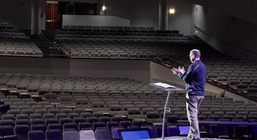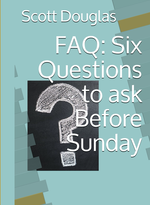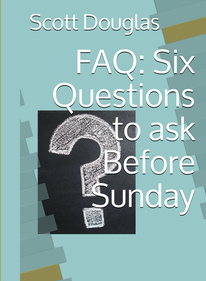|
For pastors, much of our time is spent around people. While we have a priority on our preparation, study, and research for our preaching/teaching, we operate mostly around people. Well... that's not so easy anymore. Hospitals are closed to visitors, even family. Nursing homes don't allow you to stop in anymore. Most people don't want home visits. We're not able to have Bible studies or gatherings like we're used to.
So what do we do with our extra time? It's easy to fall in to the trappings of the moment and find yourself surfing the web, scouring Facebook for the latest articles or news, pounding the last of the snack reserves, fighting the crowds to get the last roll of toilet paper, or wasting your time. The alternative is to capitalize on this season and make the most of your time (Ephesians 5:15) for your personal and professional development. Personal Development 1. Read More - You know that stack of books on your shelf that you stare at and then walk away from? Now is the time to start working through it! My encouragement is to read widely. Don't just read theology. Grab a biography, and interesting non-fiction, look at the NY Times bestseller list, see what's available on Kindle Unlimited. There's no NCAA Tournament, no NBA games, and no MLB. You can only binge watch Tiger King so long guys. And as a personal plug, my book on preaching and my book on pace in ministry are available for free on Kindle right now! 2. Exercise! - True story. You can grab so many web-based workouts and do-it-at-home options without having to use "well, the gym is closed" as an excuse. I know it's been easy to eat all your snack reserves, but take some of the extra time you have to go for a walk, do an online workout, or tackle that DIY project that's sure to get your heart rate, and blood pressure, up. 3. Worship - For so many of us in leadership, worship is something we take for granted. We take it for granted because it's a built in rhythm to our lives, and we take it for granted because when we have the responsibility of leadership we so many times fail to care for our own souls. Again, with the overload of churches broadcasting their services, Bible studies, and the YouTube library, there are no shortages of ways to worship and feed your soul. I've gotten fed digitally by friends and colleagues in ministry who I wouldn't otherwise. Professional Development 1. Free Classes - It's easy to think of learning as something we did when we were in seminary or Bible college, but this provides us an incredible opportunity to sharpen our skills and grow in our learning. Best of all, many places are already offering these! Southeastern Seminary has a large selection of online classes you can take for free. Other options include Dallas Seminary, Denver Seminary, Gospel Coalition, RTS, and Zondervan. 2. Webinars - There are a number of great webinars that are available to help us grow significantly in our ministry, especially during the COVID-19 crisis. Your email box is likely full of them. I'm typing this while I'm listening to one from Church Answers, I've got another in the queue from Barna, and another scheduled for Friday. 3. Network - You know the feeling you've got as a pastor where you don't know what you're supposed to do? Guess what, you're not alone. Before the CDC's recommendations hit hard enough that churches across the country shut down physical operations, I spent time at a pastor's roundtable. None of us could remember the "Global Pandemic" class in seminary, so we were working through some issues together. Grab your phone and call/text some other pastors and ministry leaders. Be an encouragement. Be a prayer partner. Pick their brain of how they're doing ministry now.
2 Comments
This past week has been a whirlwind for all of us. One of the redeeming qualities of a global pandemic is it disrupts our normal routines. For me, it's disrupted the routine of "I don't have time to read that right now." So last week I cranked out four books that had been sitting in the pile to read.  Since I'm a big believer in the idea that "leaders are readers" I want to pass on each of these four books as a commended resource for you. They're helpful. Challenging. Engaging. And I think you'll be blessed by each of them in unique ways. For me, each of these books was one that I read to enjoy, not to mine for every nugget of content or salient point. I did that for over 12 years of postsecondary education. I like reading and enjoying/appreciating what's written. So these reviews will be more surface or skimmed. Devoted by Tim Challies is a walk through the lives of some of the most prominent Christian figures in both recent and far off history. But the lens by which their lives are explored is unique in that it looks through their mother's influence. For moms, life can be an unending cycle of laundry and tasks and work and responsibility before putting kids to bed and starting all over the next morning. In the lives of each of these people many would call "heroes" stand (or kneel) women whose impact is being felt across continents and generations. Mom, take heart. God is working in your exhaustion, stress, and worry. And the imprints of Christ you leave on your children will be felt for generations.
Why Should I Trust The Bible by Timothy Jones is an attempt at exploring the case for the Bible through an evidentiary approach. Jones, an accomplished apologist, pastor, professor, writer, and my wife's PhD supervisor, does an incredible job of working through the issues behind the reliability of the Bible and how it is shaped by contemporary debate. What I appreciated most from Jones' work was that he didn't try to skip or end around the difficult passages and parts of the Bible, but recognizes that if we're completely comfortable then we're not reading deep enough. In many ways his faith journey shows up in the book, from a fundamentalist upbringing to an embrace of classic theological liberalism to a return home to historic confessional orthodoxy. That faith hinges on the Resurrection, and is recorded in Scripture, which speaks through the ages to us. I Am A Leader by Angie Ward is written specifically for women who may sense a call to ministry and want to understand their responsibility in following that call. I expected this to have a much more decidedly egalitarian leaning than it did. One of the things I have always appreciated about Angie is that the gap in our theological conviction has never been an issue for our friendship, joy, community, and our mutual disdain for Duke. She loves Jesus. She loves the church. And she wants nothing more than for Jesus to be glorified in her and her family's life. As a pastor, I appreciated so much of what Angie had to say in this. So many times, at least in my complementarian tribe, we focus on building walls around what women can't do. In doing so, to "stay faithful to the Word," we have created a climate that stifles the areas of ministry, leadership, and responsibility that are found in a flourishing and vital way. So much of what I've read on calling (and even written!) has been centered around the pastoral office and function. But what about those who aren't called to pastoral ministry by qualification or by perception? How can they thrive in leadership in the church? Through influence. Positional leadership ≠ influence. Influence = influence. To the sisters in the room, we need you. We need your influence. Walking With Giants by Harry Bush is a powerful personal memoir of a missionary couple and the relationships they made along the way. For many of us who are home-side pastors and church leaders, we hold the rope for the real heroes in Christianity: our missionaries. They are the ones who sacrifice the comforts and familiarity of home to chase after God's call among the nations. Not all of them live in a hut (although I think a few times Harry and Barbara would have preferred a hut to their accommodations!) but all of them know they have received a shouting call from God. For those on the field, their heroes are the national believers. And we don't hear much from them, if ever anything. That's what I've told Harry repeatedly since he shared about his dream for this book, that by publishing this he has ensured the names, stories, adventures, and testimonies of these national believers are preserved. I cannot wait to meet these giants, and hear more from them about God's work.  If you've been meeting as a church virtually for the last few weeks, you know the feeling of trying to put together a service and a sermon and record everything without the key dynamic to our personal ministry: people. We do ministry with people, among people, for people, before people. Everything about our lives is centered around people. Even in our study and preparation, it's always in the dynamic of people. So when we find ourselves preaching with a limited support crew or ourselves with an iPhone, it can be really difficult to push through. After two Sundays preaching virtually, I can say that it is twice as tiring to preach to an empty room than it is a full room. At least in a full room you have synergy, feedback, a few "Amen!" comments. When it's just you, all you've got is the red dot on your camera or whoever is helping you tape. Then what? Our reality is that for the next several weeks we'll be doing this virtual thing. It's going to be after Easter at least before things return to any sense of normal. Maybe longer. So what can we do to preach with effectiveness in an empty room? 1. Look at the camera. Easy to say, harder to do. But it's part of training our eyes to look at the camera, not at ourselves on the screen. We want to make eye contact, which is natural. So when the eyes are the selfie camera, that's where we go. But it creates disconnect with the camera. If it helps, put a sticker or something above (not on) your camera on the phone or whatever you're using the record as a visual reminder.
3. Engage and smile. Warm expressions on your face go a long way to show you're connecting with your audience on camera. Watch your local news tonight and see what kind of face they have. They're warm. They're engaging. They use their eyes to communicate empathy, concern, listening, and attention. When we're on a stage or a platform, our facial expressions are less important because there's a physical distance from us and the pews or chairs. But on camera, where we're a foot away from the lens, it's a lot harder to hide our facial expressions!
4. Treat it like a broadcast, not a service. I get it. We want to try to keep everything normal so we try to just do what we'd normally do on a Sunday, throw a camera or two in the room, and pretend like everything is usual. But it's not. Churches that typically share their in-person services may have some people who are used to the experience, but the reality for almost all of us is that we're all in the same boat. So everyone knows we're preaching to an empty or sparse room. And our routines and rhythms are so off kilter anyway that we should treat our virtual services as a broadcast first. So we don't look around the room like a normal service, and I'd even argue we should pull out from taping in our main worship areas. 5. Ask around. Find out what other people are doing and pick their brains for their ideas. Since none of us took the elective in seminary of pastoring through a global pandemic, we need to look at each other as helps and resources. Text, call, email, and ask around of your pastor friends to see what they're doing to connect and how they're preaching in an empty room. 6. Keep trying. The important thing, more than anything else, is to keep trying. Whatever you do is better than nothing. And however you do what you're doing is pushing the plow. Keep it up. Don't get discouraged. Don't compare to the megachurch pastor who's used to being on camera or the church with slick production. And don't demean the little church with poor quality who is trying their best to connect with their congregation. We're all on the same team. And we're all in this together.  Trigger Warning - If you like Pepsi you're going to want to check your heart and take a deep breath before continuing. Full Disclosure - I grew up with a mom who only liked Pepsi, so that was all we had in the house. While I have a sentimental memory of caffeine-free Pepsi cans in the kitchen, I'm all for Coke.  "I'm sorry we have Pepsi" If you've ever been out to eat and been told that when you were asking for a Coke (or for me a Coke Zero) you immediately know the feeling of disappointment. You looked forward to that refreshing cold carbonated taste of Pemberton's secret recipe, only to find out your only option was the over-sugared and slightly different taste of their top competitor. But because you're thirsty you shrug and say "That'll be fine." Even though it isn't. We're in a Pepsi time right now as churches. In suspending our worship gatherings, we're seeking to be wise in how we navigate uncharted waters with an invisible virus that has ground the world to a halt. We've been reduced to taping our worship experience (or for some churches not doing anything) with our only audience to hear our preaching is our AV team or ourselves. We're hosting prayer meetings over Zoom and spending more time on our phones calling and texting people we'd otherwise go visit in their homes or the hospital. The Zoom meetings are nice, and it's good to still worship with our music and messages broadcast, and phone calls are still helpful, it's just not the same. It's Pepsi. It'll do for now. But what we really want is a Coke. Pastors, hang in there. Churches, stay together. Believers, continue to engage and minister and serve. We can't see each other in person or be physically gathered together, but we can still take full advantage of the incredible opportunities put before us. Serve. Run errands. Call. Text. Check in. Pray. Write letters. All of these are ways we can still function as the church. It's Pepsi, but hopefully soon we'll all be able to drink a Coke. Side note - Pastors, if you're reading this, I want you to be planning for the first Sunday of "normalcy" whenever that happens. That shouldn't just be "business as usual" for you. I've already told our church that first Sunday back we're blowing the roof off the place. We'll be so glad and excited to be back together it'll be incredible. Whatever day that is for us, it'll be our Easter.  I know a lot of pastors who take Monday as their "off day" for the week. I kinda get it. Sunday is exhausting. You spent your day from early til late serving, preaching, teaching, meeting. You're physically and emotionally spent. Not everyone likes taking Monday off though. One of my seminary mentors took his off day later in the week because, in his words, "why should I be miserable on my time?" Monday for a pastor is a fresh start. I like looking at Monday as the beginning of a new work, which will culminate in our worship gathering on Sunday. So when we're thinking of how we can faithfully pastor on a Monday, let me encourage you on a few aspects. 1. Know Yourself, and Plan Accordingly - Some pastors are natural extroverts, others natural introverts. You have to know how you're wired, and plan your Monday accordingly. If you're an extrovert, don't turn Monday into an administrative day. Be around people. Take a lunch appointment. Schedule meetings for 9am Monday morning. If you're introverted, you may need Monday as a recovery day. You're peopled out. So do the mindless things that require your attention in a week. Write letters. Follow up with emails. Map out your week.  2. Start thinking about Sunday - I know it's crazy to think about, but it won't be long before Sunday shows back up. Inevitably, Sunday comes around every 168 hours. So take some time on Monday and start thinking about Sunday. I wrote all about this in a book FAQ, which you can grab on Amazon in paperback and Kindle. The whole point of the book is to give you practical steps through asking six questions to get ready for each Sunday that comes around. What I do on Monday is send the following Sunday's outline and info for the AVL team for our Sunday presentation and to our assistant for the bulletin and publication. 3. Write thank you notes - Seriously guys, handwritten thank you notes will change so much in your life. I swear by them. I started writing them about a year and some change ago and it has given me such a spirit of gratitude towards the dozens of people every week who make our church thrive. I'll write 2-3 a week and think about who helped make Sunday great. Could be a children's church worker, a greeter who went above and beyond, soloist, or someone who was an encouragement that day. Grab a stack of cards, or make them yourself (easy templates in Word & Pages) and make it a habit. 4. Pray - Was Sunday a dud? Pray. Was Sunday amazing? Pray. Did you feel like your message resonated? Pray. Did you feel like you stumbled through it? Pray. Our response to whatever happened on Sunday, and our foresight into whatever will happen this week needs to be rooted and grounded in prayer. Not just perfunctory prayer, but specific and meaningful prayer. We can't expect a church to thrive if it's not rooted in prayer from its leadership. If we get prayer requests on our contact cards, I'll pray over them on Monday. I'll pray for the guests we had. For the message to bear fruit. For the people I know going through stuff.
5. Relax and Don't Quit - Sometimes I think pastors suffer on Monday because they feel the weight of the world on their shoulders. The good news is that it doesn't. You're not the one responsible for the success or failure of God's work. Your job is to be faithful, work hard, and trust Him. The best news is that God has promised to finish what He started. And that doesn't get derailed just because you forgot to mention the potluck and got cornered about it. Or that you forgot your point in the message. Relax. God has this. And don't quit on Monday. It's going to be ok. |
Scott M. DouglasA blog about leadership and the lasting legacy of family ministry. Archives
August 2023
Categories
All
|



 RSS Feed
RSS Feed



